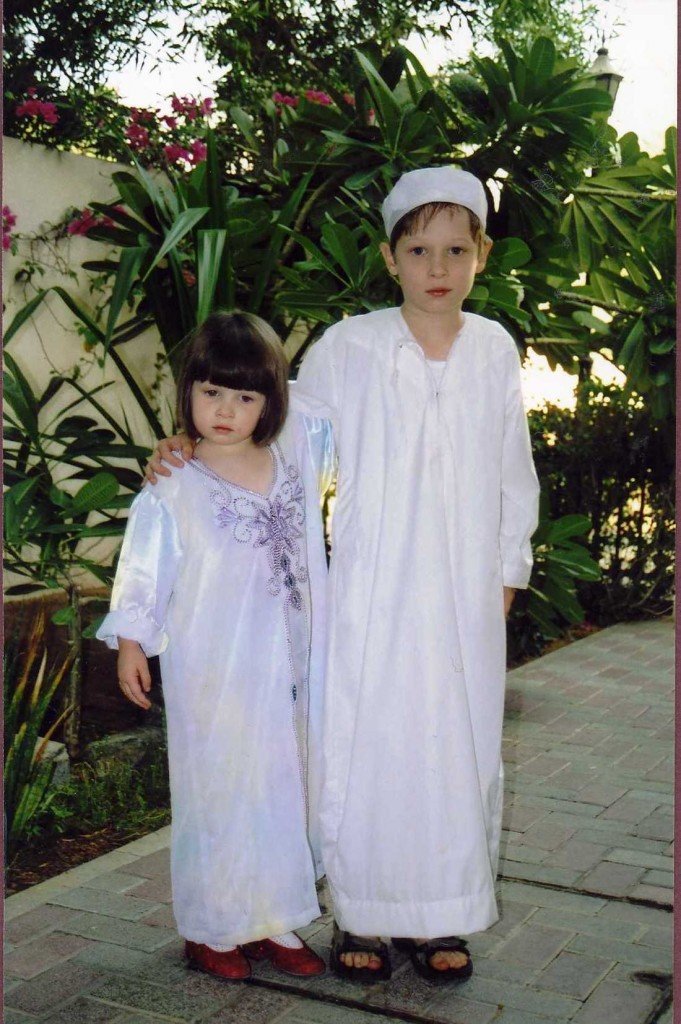Raising Arabic-speaking Children in Dubai (Part 2)
In my last post, I narrated our attempts to raise bilingual children in Seattle. Our plans were not working. So, in 2001 we moved to Dubai with the goal of exposing our children to Arabic language and culture. We were moving to an Arab country. How hard could it be?
Once in Dubai, we had to choose a school right away. At the time the American schools offered little or no Arabic instruction. International schools typically offered the minimum—one hour per week!
We selected a private bilingual Arabic/English school where students studied Arabic using the national curriculum. They had two hours of instruction in Arabic per day while other subjects were taught in English with American textbooks. It sounded like an ideal bilingual situation—right?
Meanwhile, we soon figured out that Arabic wasn’t widely used in Dubai. With 80% of the population as expats, English is the language on the street—a fact we couldn’t quite grasp until we experienced it for ourselves. Thankfully, our children were exposed to some Arabic via their Palestinian relatives who lived in the UAE.
Besides, our children would learn Arabic in school, right? Well, we gradually discovered a problem there, too. The general method of Arabic instruction was “Copy/Memorize”—an approach shockingly behind the times (a problem all over the Arab World, not just in Dubai). My first grade son complained bitterly that he “hated” Arabic class (a complaint repeated for years).
My husband and I tried to stay upbeat despite the tortures of Arabic homework, which consisted of copying passages, memorizing texts, practicing dictation, and often shedding tears. I wondered if it was worth it. My husband said, “Of course!” Meanwhile, he, who had been so diligent about speaking Arabic to our children in Seattle, now began to let English creep in.
The next year, our daughter started kindergarten and continued her policy of never speaking Arabic. Year after year, she remained mute in Arabic class. Our parent/teacher conferences went something like this: “She seems to understand Arabic. She just won’t speak. Not one word.”
Of course, unlike in Seattle, none of our Dubai neighbors were impressed with our bilingual attempts. Their children were bilingual or trilingual—and seemed to achieve this effortlessly.
“What’s the big deal?” one Moroccan friend asked. “Kids naturally pick up language.”
Yes and no, I tried to explain (a bit too defensively). Children pick up spoken language —provided they get adequate exposure. However, learning to read in two languages (especially two different scripts) takes effort. To complicate matters, the Standard Arabic taught in schools is hugely different from the dialect spoken at home.
Around this time, we began a long string of Arabic tutors. They were mostly women who had been teaching Arabic for decades and were set in their Arabic-teaching-ways. When the tutor came to the door, our children ran and hid. Granted, because of the tutoring, they were able to pass Arabic class (barely), but our children had developed a negative attitude toward Arabic.
By then, my husband was speaking more English at home. Despite weekly visits with Arab relatives, Arabic had become more like a “foreign language” for us. My son would speak it only when prompted. As for my daughter, she still refused to utter a word of it. I came to accept that she would be a “passive bilingual”—understanding Arabic, but never speaking it.
As for English, I realized our children were slipping behind their American peers in writing. Also, with so many hours spent on Arabic, it left no time for the arts. I continued to wonder if it was worth it. My husband assured me it was, but he, too, began to have doubts.
After four years, we eventually found space for our children in an international school which offered daily Arabic instruction. We waited for an improvement….

 Follow
Follow
Holly, I have lived through so much of what you are describing. I wish you luck. We were not successful in our attempts to raise bilingual children.
@Clarissa Southwick
Hi Clarissa, Thanks for your comment. Yes, it had been so much more challenging than we expected. Strangely, as soon as we threw up our hands, things started to slowly improve…
Oh how this topic stresses me out. For me there is a lot of guilt involved, blaming, second guessing…ahhhhhhhhhhhh i need some fresh air…
Well, what can I say…..both my husband and myself are Arabic speaking Egyptians and my daughter stopped speaking Arabic since the age of 5. She refused point blank. We tried everything, cajoling, threatening, the whole thing….but still she won’t speak Arabic. We were living in Kuwait were Arabic was much more prevalent than here. She went to an American school that offered daily Arabic classes and 90% of her friends were Arab….but because they spoke different “Arabics” and the lessons were as you describe shockingly behind the times, Arabic to her was an irrelevant language…English was easier and more fun! Anyway, I finally gave up a couple of years ago (she’s now 14) and started speaking in English to her because she now barely understands beyond the basic words of sit..eat…sleep…
Now I’m all worked up again about it…need to go have a chocolate 🙂
@Soha
Thanks for sharing your experiences. I know quite a few Arabic-speaking families in Dubai whose kids prefer English. I think in this international setting we gain something… and we lose something.
@Jennifer
Sorry to dredge up unpleasant feelings! This issue is such as challenge & as mothers, we tend to blame ourselves. When really, there are so many factors out of our hands.
We went to Jordan when my kids were 15, 3.5 & 2. The oldest went to an all-English school. She had daily Arabic, but was behind because the other kids spoke it all at home. They didn’t know how to read & write, as she did, but the class was geared toward conversation. When she got a C on her first report, I asked the teacher what we could do to improve her grade. Her reply, “Would you like me to change her grade to an A?” I put the middle girl into an Arabic-only preschool. The first week I attended with her & advised her to listen carefully to the teacher & then copy the other kids when she spoke. It wasn’t long before she not only picked it up without an accent/ with perfect pronunciation, but within 6 months she was translating! The youngest began the same school at 2.5 yrs & soon spoke it perfectly, too. They began speaking only Arabic w/ their relatives, too. What was even better, they spoke Arabic to eachother — it became their language of play. When we returned to the US 13 mos later, initially they still spoke it together. However, their dad (against my urgings) spoke & read English to them & they entered preschool where the language of play became English. Today as middle-schoolers, they know nary a word. (Although when they do speak, they still have that perfect pronunciation.)
Sounds very frustrating. Being naturally bilingual is an incredible gift, but you can’t force even your own children to accept a gift, I suppose. Maybe if you let it go now, they’ll come back to it in their teens or young adulthood, as they begin to explore their heritage, as people do at that age.
Maybe because the kids could see how important it was to you, they subconsciously (or not!) decided to sabotage it. It is telling that when you “threw up your hands”, they started to go for Arabic. Maybe they could sense that they would no longer get such a rise out of you…?
So interesting to read what you went through!
I will refrain from posting particulars, but my kids saw your adorable picture and asked who is the cute little girl that is standing with Z2 (your third born 😉 ) I never realized how Z1 & Z2 look so much alike!!!!
My husband and I (both non-Arab) decided to move to the Middle East with the hope that our kids would learn to speak Arabic. We wanted to live in a place where we could speak English, and learn Arabic, and have our kids learn Arabic. We settled for Sharjah in the UAE, which provided a seemingly perfect balance. Our girls H and FZ were 3 years old and 5 months old respectively, when we moved. FZ’s first words were in Arabic. Her first greetings were “ahlan and shu akhbarak?”. She started school at SCS in Sharjah, which has a commendable Arabic Language programme, loosely based on Jolly phonics. I thought she would flourish. FZ is now 5, and I have experienced uncannily similar issues. Her Arabic teacher at school suggested a speech therapist, because she thought FZ couldn’t speak. She would sit mute, arms folded whilst her tutor/homework helper tried to coax her into learning something. But, when playing school, would teach her younger sister how to write in Arabic. The tutor suggested therapy. After hearing my story, the therapist calmly asked me if I was aware that my child was just 5 and had a tutor 4 times a week, quite abnormal for a 5 year old. She couldn’t understand my obsession. I stopped the tutor, and suddenly FZ was able to do her homework by herself, and speaking to us in Arabic. Although now that we are back in Africa, she refuses to acknowledge anything said to her in Arabic….and her name has change from Faatma to Fat-tee-ma. Kids!
Apologies for the loooong comment 🙂
I’ve so enjoyed everyone’s comments…even the angst-filled ones. It’s reassuring to me that others have gone through similar experiences. Thank you for sharing your family stories.
my poor parents <3
I have the exact opposite problem!
My family and I have been living in Jordan the past few years and my wife is a Jordanian who only speaks Arabic, so my daughter only understands Arabic, even though I am a native English/bi-lingual speaker. Additionally, she was going to a mainly Arabic school, which was kind of weak in English, and I did not practice enough with her at home, because I am usually at work.
Now the problem is we are moving to Dubai and I cannot seem to find a school that will accept her. It seems like most of the pretty ‘good’ schools require her to have excellent English to even get in, and I am having a hard time finding where to put her, if I can find her an opening. She is in the second grade and we are moving half-way through the year, because I have a new job.
If anyone has any comments or suggestions, I would love to hear them.
Thanks.
Hello, Sorry I didn’t see your comment earlier.
Rest assured, many children come to Dubai without much English. The international schools usually have English-as-a-Second-Language programs to get students up to speed. I suggest asking around for the names of international schools. My advice: Don’t worry about the “status” of the the school. Rather, look for a good fit for your daughter. Good luck and all the best to you. Holly